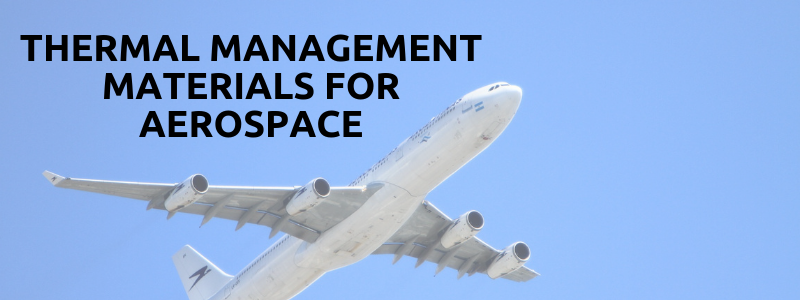
Thermal Management Materials for Aerospace
In the aerospace industry, thermal management materials are mission-critical. While safety and efficiency have always been at the heart of aerospace technology, the integration of more functions into smaller components now requires increasingly adaptable thermal management solutions.
This is especially true in the field of unmanned aircraft, where electrical components can generate considerable heat.
Here, we look at key aspects of thermal management materials for aerospace, but also how technology is driving change in this area.
An important factor in these developments is the use of thermal interface materials (TIMs). These help manage, block and dissipate heat in aero electronics applications.
Putting Protection at the Heart of Flying
While there are key issues for aerospace around flight security, flying also involves challenging environmental conditions. These require advanced thermal management materials to ensure superior insulation and protection for aircraft exteriors, interiors and flight components.

Due to the mechanical demands of aerodynamics, any thermal management materials must be lightweight and adaptable, but also able to withstand extreme conditions, including heat, cold and physical impact.
Mica is a naturally-occurring material with unique properties. which make it ideally suited as a thermal management material for aerospace.
Protecting Thrust Reversal Systems
Thrust reversal is an essential flight manoeuvring process, whereby an aircraft’s engine thrust temporarily directs forwards instead of backwards. This helps to slow the aircraft down by working in opposition to the forward motion of the aircraft.
This aspect of deceleration allows aircraft to use shorter landing distances while reducing the wear on their brakes. It is also potentially very dangerous.
Reverse thrust makes the jet blast flow forward, so thermal management is essential to contain the intense heat generated.
Modern jet engines require a higher demand on thrust, generating greater heat through this and through their components. At the same time, these thrust reversal systems must meet ambitious environmental targets.
Therefore, any thermal management system has to both protect and enhance engine performance. Mica is the perfect thermal interface material for enabling these functions.
Thermal Management for Aircraft Batteries
The battery on an aircraft starts the engine and auxiliary power units and provides an essential, emergency back-up power resource.
Consequently, it requires an advanced degree of protection, both from heat it generates and from external elements, including extremes of low as well as high temperatures.
The battery’s resilience is bolstered by materials used to protect it and conduct heat transfer. Again, mica provides an adaptable, lightweight and durable thermal management solution.
The Importance of the Flight Recorder
An aircraft’s flight recorder, or black box, contains vital information in the event of a crash or other incident. Investigators can discover information about events leading up to and during the event by looking at the data on the black box.
The evidence they gather can also help in future research and development in the aerospace industry.
This means, however, that the flight recorder must have as much protection as possible. It must be able to withstand extremes of environmental conditions and force.
Typically, a flight recorder’s fundamental specifications will include impact velocity and crushing distances. Also, it must be thermally resistant, with a material forming its housing, which will manage heat transfer effectively.
The device itself contains delicate, sensitive circuitry, requiring an advanced level of thermal management. Because mica is both thermally resistant and electrically conductive, it can protect the workings of the black box without risk of impeding or interfering with its performance.
Thermal Management for Aircraft Components
The combination of jet-fuelled flight with high-performance, advanced electronics means that the environment is one where intense levels of heat are being generated.

Mica supports thermal management for a range of sensitive components in aircraft. These must be individually circuit-protected to protect against the risk of circuit overload.
Due to its flexibility, mica can be shaped into intricate shapes that are nonetheless durable and possess close tolerances.
Thermal Management Materials and the Future of Flight
Effective thermal control helps drive and enable innovation in aerospace design. Thermal interface materials are vital in supporting advanced thermal management solutions for aircraft, including commercial and military applications.
There are different thermal interface materials available, including both polymer and metal matrix composites and insulating papers.
Mica ably fits into this category, by virtue of its natural insulating and thermally conductive properties, and the fact that it can combine with various resins to form an effective thermal interface material.
As the emphasis of aerospace development has shifted from traditional, mechanical, pneumatic and hydraulic systems to electronics and ever more sophisticated circuitry, so the thermal management materials to support these innovations have needed to keep pace.
Despite being a well-established, natural mineral material, mica has proved itself highly adaptable to new technological developments.
It works in cutting edge thermal designs, just as it has performed essential functions in thermal management across a broad range of industries.
Your Thermal Management Solution
Mica is the basis for a broad range of options and applications as a thermal management material, supporting the aerospace industry.
Please call us on +44 20 8520 2248 for more information. Alternatively, you can email sales@elmelin.com, or complete our online enquiry form. We’ll get back to you as soon as possible.
